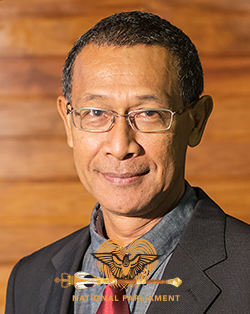The Papua New Guinea Parliament may consider some changes to the market concentration levy, or so-called ‘super tax’ this week.
Treasurer Ian Ling-Stuckey yesterday said consultations were held with three major companies likely affected by the proposed new tax – BSP, Digicel and Telstra.
He said as a result, there may be a change in the tax name to indicate the focus is an additional tax on highly profitable companies that dominate the banking and telecommunications sectors.
“The Parliament will then be asked to consider any amendments, probably on Thursday of this week,” he said.
Ling-Stuckey said consultations were held with the Minister for Communications, his Secretary, and the Governor of the Bank of PNG, key regulators, including the Independent Consumer and Competition Commission (ICCC), and the CEO and Chair of the National Information and Communications Technology Authority (NICTA).
He said the view remains that Papua New Guinea has some sectors that earn high profit levels compared with other nations.
“Our banking sector is one of the most profitable in the world, with the huge gap between almost nothing being paid for savings and very high interest rates for loans,” he said.
“This does benefit shareholders, including the minority of Papua New Guineans that are lucky enough to be in the formal workforce and paying superannuation.
“However, these profits are earned from the very high interest gaps between savings and investments that many more people in PNG are paying.
“We are simply looking for a fairer share to the people of PNG as a whole – and only asking for a small part of the total level of super profits.”
Meanwhile, Association of Superannuation of PNG president, Ian Tarutia, said as an industry, they were not formally consulted on the tax despite reaching out through a signed letter by the chairman, and have not been granted the opportunity to present its case to talk about the impacts it will have on the portfolios of the funds.
Ling-Stuckey said that the country has also seen high levels of profitability in the telecommunications sector.
“During our discussions, although this information was available from other public data, it has been confirmed that Digicel has earned a very high rate of return on its investments in PNG,” he said.
“Most of these returns are through the very high capital gain they stand to make when they sell their assets to Telstra for US$1.6 billion, or over K5 billion.
“There have also been good consultations with Telstra.
“These have highlighted an expected increase in taxes of K41 million (US$11 million) each year as the former royalty payment tax deductions by Digicel to itself will no longer be made,” he added.
“In addition, there has been a commitment to increase investment in towers throughout the country.
“Combined, these are worth more than the earlier proposed levy.
“We were always interested in a fairer sharing of the profits in the telecommunications sector, and the new approach is doing this.
“We know that some may not like the outcomes, but this is a government acting in the interests of all the people of PNG in this critical work of budget repair,” the Treasurer said.
